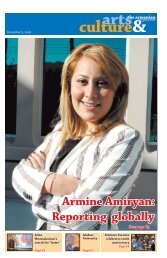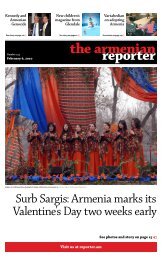National, International, Armenia, and Community News and Opinion
National, International, Armenia, and Community News and Opinion
National, International, Armenia, and Community News and Opinion
- No tags were found...
You also want an ePaper? Increase the reach of your titles
YUMPU automatically turns print PDFs into web optimized ePapers that Google loves.
The <strong>Armenia</strong>n Reporter | November 8, 2008 19<strong>Armenia</strong>Martin Yeritsyan, st<strong>and</strong>ing center, participates in a master class led by VahagnNikoghosyan, seated 2nd from right, in the U.S. – at Oberlin. Yeritsyan archive.Pochette, 2006.Martin Yeritsyan holding a sound board of a violin.Three generations of Yeritsyans, Martin (l.) Karen, Shahen. Photo: Yeritsyan archive.Professor Yeritsyan’s immeasurable wealthto know if there are people who willcontinue the work of the master.“Usually this is an art or craft whichis h<strong>and</strong>ed down. My father was theone who established it in <strong>Armenia</strong>.To date his instruments are highlyvalued, as he created amazing instrumentswith an Italian timbre.Currently there are talented <strong>and</strong>superior youngsters at the conservatorywho play on violins, violas<strong>and</strong> cellos made by my father <strong>and</strong> I.Many have become laureates.“And, as I already said, since this isusually h<strong>and</strong>ed down, currently mysons continue the work. My olderson Tigran lives in Spain <strong>and</strong> plays,”Martin explains. Tigran is not onlya musician but he also renovates<strong>and</strong> makes instruments there.“My younger son Karen is herewith me <strong>and</strong> we work together.Karen is also both a musician <strong>and</strong>makes instruments. In 1990 hereceived a diploma as a talentedmaster at the <strong>International</strong> TchaikovskyCompetition. As a violinisthe played together with ArtashesMkrtchian, Martin Yavrian <strong>and</strong>Barouyr Shahaziayan in the AramKhachatrian String Quartet <strong>and</strong>there was something symbolic inthat. However, since that quartetno longer exists, he spends moretime on making new instruments. Iam hopeful <strong>and</strong> sure that my gr<strong>and</strong>children[the master has 7 gr<strong>and</strong>children<strong>and</strong> 3 great gr<strong>and</strong>children]will also be able to continue thisfamily craft established by theirgreat gr<strong>and</strong>father,” says the muchhonored master with a luminous<strong>and</strong> kind expression while showingme their photographs.One of the most honest<strong>and</strong> difficult worksSo far Master Martin Yeritsyan hasprepared more than 500 violins,about 300 violas <strong>and</strong> 30 cellos, notcounting the more than 20 kanons,15 kemanis, 7 bass kemanis, 2 violada gambas, 2 pochettes <strong>and</strong> 2 violapomposa. By the way the making ofviola pomposas has an interestingstory. “English viola player SimonRowl<strong>and</strong>-Johns asked me to make afive string violas for him with whichhe could play Bach’s suites. Bachwrote suites for the cello <strong>and</strong> in orderto play them on the viola, he requestedsuch an instrument, namingit ‘viola pomposa.’ Within a year,Rowl<strong>and</strong>-Johns recorded all thosesuites in Engl<strong>and</strong> using the instrumentmade by me. He sent me twoof his CDs. What I am trying to sayis that you have to be devoted to theart of creating musical instruments.You have to devote yourself to thework in order to create somethingvaluable <strong>and</strong> worthy of admiration,”says my renowned interlocutor.He then turns to the cellos: “Iam proud that I am now workingon my 31st cello. When I finishedthe 29th, our talented cellist VahramSarajian played Babajanian’sconcerto on it during the openingceremony of the Aram KhachatrianCellists Competition <strong>and</strong> the entireaudience was thrilled <strong>and</strong> amazed.When it was announced that Saranjianwas to play on Martin Yeritsyan’s29th cello, the entire hallalso applauded for me, since theinstrument sounded thrilling <strong>and</strong>I was proud of that.” Another oneof Martin Yeritsyan’s cellos wonan award during the Stradivarius<strong>International</strong> Competition in 1980(Italy). This was followed by manyother awards <strong>and</strong> diplomas at differentprofessional reviews. Themaster has given <strong>Armenia</strong>n namesto the majority of his instruments:Masis, Gohar, Rouzanna…I ask the master what it means tohim when he makes a violin. “Makinga violin is one of the most honest<strong>and</strong> difficult things to do. It is avery difficult job, of course, becauseit dem<strong>and</strong>s great energy <strong>and</strong> devotion;great devotion to finishingthe work <strong>and</strong> creating the best instrument.To me it is God’s greatestgift which I have inherited frommy father. I have learned the craft,it can be called art now, with thehelp of which my works are alreadyfamous throughout the world,” hesays.It seems as if inanimate objectscome to life at the touch <strong>and</strong> skillin his fingers. Is it magic? No. Thereis no magic here. There is simplya skill which has reached perfection.Striving for perfection canbe viewed as a unique miracle; themiracle of loving one’s work <strong>and</strong>devoting oneself completely to it.Fragments from thedisaster of 1988My experience as a journalist tellsme that a remnant of a violin thatI see hanging from the wall has astory. When I ask about it, MasterYeritsyan tells me that during thedevastating earthquake of 1988 theviolin, which had been made for astudent had been buried under theruins <strong>and</strong> severely damaged. Thelittle owner of the violin had fortunatelysurvived. His family hadbrought the damaged violin to themaster, in order for him to renovateit. “It was a damaged instrument.I renovated it. I kept the upperbody of the violin as a souvenir,”says that master <strong>and</strong> falls silent.Breaking the silence I ask the <strong>Armenia</strong>nviolin magician how it feelswhen people bring instrumentsto him which he has made: “I feelhappy especially when,if I had forgottenabout the instrument, thedate on the label inside will remindme of when I made it. I rememberwho ordered it. It sometimesturns out that the instrument hadbeen ordered by one person <strong>and</strong> intime has gone from one h<strong>and</strong> to another.When I see the instrumentsagain it feels as though they havereturned home. Every one of myinstruments are dear to me. Allottingthat much time <strong>and</strong> h<strong>and</strong>lingthe instrument continuously whileworking on it creates a bond.”I ask him if he has ever tried tomake his own unique violin by makingsome innovative changes.“Ofcourse I have. Probably I was influencedby Picasso when I decided tocreate a completely atypical violin.And imagine I was able to createsuch a distorted instrument. Oneof them was some 30-40 years ago.When Rogiero Ricci was in Yerevanfor a concert, I asked Ohan Durianto show him the violin <strong>and</strong> tryto play on it. After seeing the instrumenthe started to play on it<strong>and</strong> noted that the tone was verygood. The instrument was soldmany years ago. I once received anorder for an electric violin, withan original shape. However, thosewere mainly experimental <strong>and</strong> donot have a future. It is unnecessaryfor a professional master to w<strong>and</strong>eraway from the classical.”I do not need a lot ofmoneyOther than earning money, whatelse can a job offer? “It gives onea passion to live. I know that tomorrowI have to get up <strong>and</strong> finishone instrument <strong>and</strong> then create another,which will enter the pages ofhistory,” notes the master.I ask the master luthier whatit means for himto live <strong>and</strong> workin <strong>Armenia</strong>.“You know, my fathercould have gone to Europe, for example,to France. He could havegone to America <strong>and</strong> become a renownedmaster there <strong>and</strong> a verywealthy person, but he preferredto come to <strong>Armenia</strong> <strong>and</strong> live inhis country. Even now I havemany friends who invite me to goabroad, to America, stating that Ican become a very, very wealthyman in a year. However, I do notneed that much money. For me itis more important to make instrumentsfor young <strong>Armenia</strong>ns whichwill always be remembered, here inA gift to MasterYeritsyan froman <strong>Armenia</strong>nartist.the house constructed by my father<strong>and</strong> where I was born. Even thoughI have received many orders fromabroad, I prefer making inexpensiveinstruments for <strong>Armenia</strong>nchildren, the <strong>Armenia</strong>n youth, forthem to play on a good instrument<strong>and</strong> play here,” he tells me frankly.“Seeing them play on instrumentsmade by me is the greatest happiness<strong>and</strong> pleasure; the greatest rewardfor my efforts.”After a moment of reflection, hecontinues, “Do you know what livingin <strong>Armenia</strong> means? The air <strong>and</strong>water that <strong>Armenia</strong> has… I havebeen in many countries, but thosethings are not as they are in <strong>Armenia</strong>.Wealth is that which you havebeen given. Thank God I am stillvery rich. I am rich when a studentplays on one of my instruments<strong>and</strong> afterwards, seeing me, greetsme with a smile. I feel that I am doinga good thing for my nation, forthe <strong>Armenia</strong>n child, for talentedviolinists <strong>and</strong> for people in general.”ttt…I am walking along BaghramianAvenue. It is a typical autumn dayin Yerevan. Trees with their yellow<strong>and</strong> red leaves are poking theirheads out between the buildings. Iwalk <strong>and</strong> feel proud for that I amliving in the same country as MartinYeritsyan, that I have such acompatriot. I feel as if the worldhas somehow exp<strong>and</strong>ed after meetingwith the <strong>Armenia</strong>n magician ofthe violin; kinder <strong>and</strong> purer. f
















